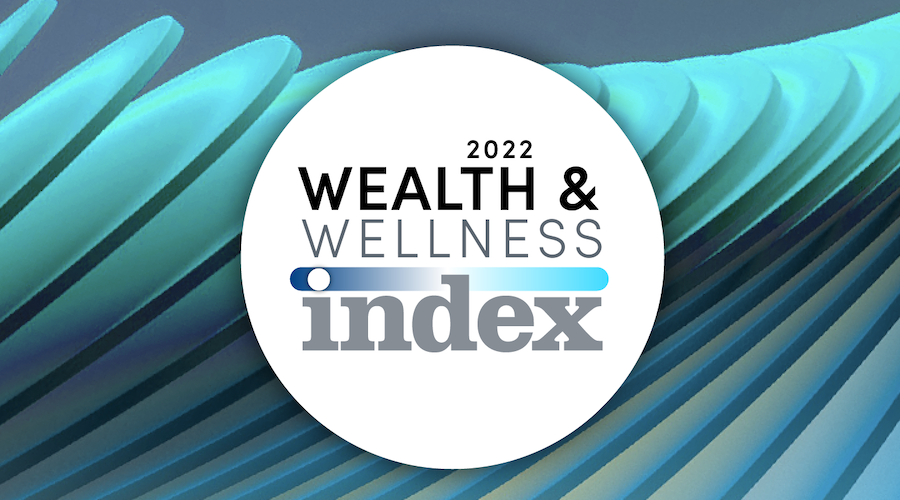Key Findings
A vast majority of U.S. consumers* are concerned about rising inflation (85%) and a recession (74%), and over half (56%) say their standard of living is declining.
There is a significant uptick in the percentage who feel “very unhealthy” financially, especially among women (26%) and those who have changed jobs in the last year (27%).
69% think their income isn’t keeping up with inflation, but less than half (41%) are asking for a raise at work.
The average salary needed to feel financially healthy dropped 13% in the past six months to $107.8K, though expectations remain higher among men ($129.5K) and Millennials ($133.8K). Conversely, the average savings needed to feel financially healthy spiked 17%.
79% of cryptocurrency owners are concerned about market volatility.
U.S. consumers are feeling the squeeze of record-setting inflation, market volatility and a looming recession – and it’s taking a toll. Over half (56%) of Americans say their standard of living is declining, and nearly 4 in 10 (38%) are feeling financially unhealthy, according to a Personal Capital and Empower survey* fielded by The Harris Poll.
With a vast majority concerned about rising inflation (85%) and a potential recession (74%) knocking their financial stability, here’s how today’s worries are showing up in consumers’ spending, saving and investing habits.
Bracing for the storm: as worry increases, 73% of people are taking financial actions to prepare.
People are battening down the hatches to prepare for a recession.
To hedge against inflation, nearly half of people say they’ll change their investment approach (49%) and will contribute more to retirement savings (54%).
Some 71% say they’re cutting back on daily expenses, reining in spending on entertainment (41%), dining out (40%), and travel (40%). But, not so fast when it comes to their favorite things: 33% of people say they “won’t be switching to cheaper brands than I normally buy.”
Notably, women are more likely than men to say they’re cutting back across all top spending categories.
Economy, on the rocks. Consumer spending is focused on experiences – those we can live with, and can’t live without.
Despite their worries, many are living it up when it comes to travel – especially Millennials (aged 26-41). They’re also the generation least likely to cut back on travel in light of inflation (35% versus 40% general population).
In May, the average Personal Capital user spent** $1,304 on travel. That’s 227% more than the pandemic low of April 2020 at $399 and 28% more than pre-pandemic levels of $1,017 in February 2020.
Though survey respondents say they plan to cut costs, anonymized Personal Capital spending data** shows consumers are still putting increasingly more money into entertainment, food, travel and gas expenses.
Cryptocurrency remains a gamble – some have FOMO, while others say ‘no go.’
As many investors grapple with how – or whether – to incorporate crypto assets, Millennials (50%) and GenZ (49%) are disproportionately worried about its impact on their financial health, compared to the general population (33%).
Crypto’s a big conversation right now. If you’re interested in adding crypto to your portfolio, the place to start is by assessing your diversification and risk tolerance.
“We do not believe most investors need to concern themselves with adding crypto to their portfolios, if not inclined to do so,” says Lacey Cobb, CFA, CFP® and Director of Advice Solutions at Personal Capital. “Crypto assets require a high risk tolerance – these are highly volatile investments with unknown return assumptions that add risk to a portfolio. As with other speculative investments, limit your positions to an amount you can afford to lose.”
Great reset…or regret? Financial confidence wavers at work.
Over half of Americans (54%) say anxiety about the current environment has impacted their work performance.
32% of people are worried the return to the office is impacting their finances.
More than half (56%) of respondents are opting for a side hustle or another alternative income stream in light of inflation, and 61% of Millennials are concerned about a possible job loss impacting their finances.
An uneasy financial climate has dulled people’s salary expectations; the average salary needed to feel financially healthy dropped 13% from six months ago to $107.8K. However, the ideal income still remains higher among men ($129.5K) than women ($83.9K). Millennials and Gen Z have higher-than-average salary expectations ($133.7K and $171.6K, respectively).
“Yeah, making more money is great, but it’s what you do with your earnings that makes the real difference,” Cobb says. “Regardless of the number on your paycheck, avoiding high-interest debt and saving a meaningful percentage of your income can put you in a better spot in the long run.”
In terms of stowing away earnings, respondents say they need to have saved $529.9K to feel financially healthy. Again, savings expectations are higher for men ($584.6K) than women ($468.7K). Men are also contributing more frequently (82%) than women (63%) to employer-sponsored retirement accounts.
Got advice? Nearly half (46%) of Americans confess they don’t know how to invest.
A majority (54%) feel they’re not financially optimized, agreeing, “I feel like I am losing money with it in a savings account versus being invested.”
54% of people say they wished they’d gotten financial advice earlier.
So what are some strategies?
“Don’t sell your investments in a panic,” says Craig Birk, Chief Investment Officer at Personal Capital. “Stocks can be a secret weapon because they offer you one of the best chances to mitigate the impact of inflation and, in the long run, you’re well-positioned to beat it several times over.”
Over the past 30 years, the average annual inflation rate has sat around 2.31%. (Current U.S. inflation is at 8.6%.) But the average historical return of the stock market over time is about 10%.
“In a choppy market, there are plenty of opportunities to take control of your money. Knowing your net worth puts you in the driver’s seat because you need a real-time measure of your financial health to make smart moves,” Birk says.
As always, the fundamentals hold true, according to Cobb. “Take a critical look at your financial situation. Pay down consumer debt. Build emergency savings. Identify your discretionary spending. And don’t lose sight of your long-term goals; keep contributing to your retirement accounts, especially if you get a 401k match from your employer.”

